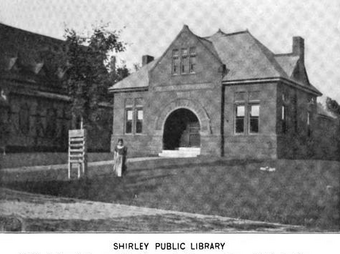Shirley Village Historic District facts for kids
Quick facts for kids |
|
|
Shirley Village Historic District
|
|

The Hazen Public Library, c. 1899
|
|
| Location | Shirley, Massachusetts |
|---|---|
| Architectural style | Greek Revival, Gothic Revival, Federal |
| NRHP reference No. | 91001958 |
| Added to NRHP | January 23, 1992 |
The Shirley Village Historic District is a special area in Shirley, Massachusetts. It's where the town's main shops and factories used to be. This district is in the southern part of Shirley. It grew around old mills next to Catacoonamug Brook. Later, a railroad built in the 1840s helped it grow even more.
Today, it includes 441 buildings and properties. You can find it near Center, Harvard, Leominster, and Shaker Roads. This important area was added to the National Register of Historic Places in 1992.
Contents
Discovering Shirley Village's Past
The town of Shirley was first settled in the 1720s. It officially became a town in 1775. The original town center was closer to the middle of Shirley. This old center is now known as the Shirley Center Historic District.
How Shirley Village Grew
Shirley Village became important in the 1800s. It grew into a busy industrial area. Soon, it became more important for business than the old town center. It even became the home of the town's main government buildings.
Catacoonamug Brook was very important for the village's early growth. As early as 1740, there was a gristmill and a sawmill here. These mills used the power of the water to grind grain and cut wood.
The Railroad's Impact
Lancaster Road goes through the village. It was the only major stagecoach route in the town. This meant many travelers passed through Shirley Village.
In 1845, the Boston and Fitchburg Railroad built tracks through the village. This was a huge change! The railroad made it much easier to move goods and people.
Cotton Mills and Homes
After the railroad arrived, cotton mills became very important. These factories made cloth from cotton. The large building of the Phoenix Mills is still standing today. It reminds us of this busy time.
In the late 1800s, many homes were built. These were mostly simple wooden houses. They were built on the south side of the railroad tracks. This shows how much the village was growing.
Exploring the District Today
The main part of the district is on the western side. Here, several roads meet. These include Leominster, Lancaster, and Harvard Roads, along with Main Street and Center Road.
The district spreads out from these intersections. It goes a bit along most of these roads. It also extends further east along Front and Fredonia Streets and Ayer Road.
There is one cemetery in the district. It's called the Village Cemetery. It's on Harvard Road and was started in 1849.
Important Buildings to See
You can find several interesting brick buildings here. These include old schoolhouses. There's also a war memorial hall. The library is another notable building. It's a beautiful building made of brick with brownstone details. It was built in a style called Richardsonian Romanesque.



